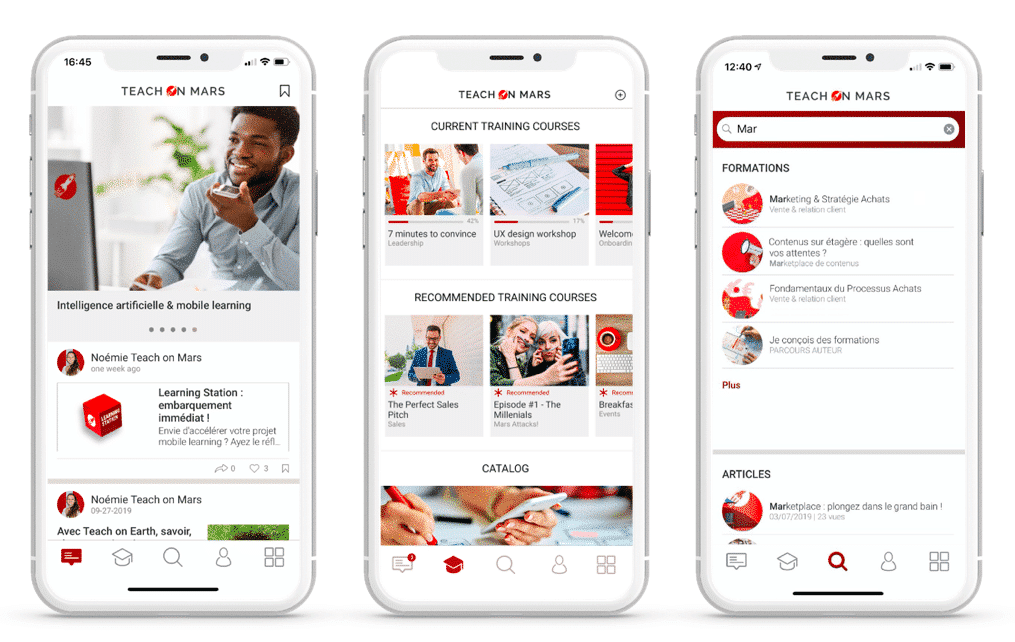Nowadays, we use search engines more than anything else. Whether you are looking for a recipe, a movie trailer or a locksmith because you are locked out, our first reflex is often Google, Bing or another search engine. Why should it be any different when it comes to training?
In their training application, your learners can discover content on the Wall and in the catalogue, but also thanks to the search engine to which we are about to make significant improvements.

The Wall, the training catalog and the search page
Improved searches
Each training course in your mobile app has a title, a description and tags. The Teach on Mars search engine currently searches among these three main elements. At the start of 2021, the search engine will also take into account the names of the modules and educational activities, as well as the educational content itself.
So, if a learner searches for “One Note” for example, a course on the Microsoft Office suite may appear in the results simply because “One Note” is mentioned in a few cards of one of the activities of this course.
Smart searches
When you’re looking for a “management” training course, are you surprised when you see the result, “How to be a good manager“? Or, when you mistakenly typed “Marketign“, isn’t it great when the search engine understands that you actually meant “Marketing“?
We have recently added these innovations to our training search engine to simplify the life of your learners. To this end, we have added new features based on artificial intelligence, including Automatic Natural Language Processing (NLP). Our search engine now includes language analyzers for many of the world’s most common languages: Arabic, Armenian, Basque, Brazilian, Bulgarian, Catalan, Chinese, Czech, Danish, Dutch, English, Finnish, French, Galician, German, Greek, Hindi, Hungarian, Indonesian, Irish, Italian, Japanese, Korean, Kurdish, Norwegian, Persian, Portuguese, Romanian, Russian, Spanish, Swedish, Turkish and Thai.
With these linguistic analyzers, when a user makes a search, for each language the search can automatically:
- Remove diacritics (e.g. accents) so that “rôle” is equivalent to “role”.
- Remove the distinction between singular and plural or between verbal tenses (e.g. “jump”, “jumped”, “jump”)
- Remove commonly used “stop words” such as “the”, “and” and “or” to improve performance
- Consider synonyms so that when a user searches for “UK”, we can retrieve courses containing “United Kingdom” as well.
- Check for spelling mistakes or alternative spellings, or matches on homophones. For example, in English “their” and “there”.
A better indexed search
Beyond displaying more results, our new training search engine presents them to the learner in an intelligent way. The learner will see the results corresponding to his or her preferred language first, although results corresponding to other languages are also taken into account.
In addition, the results are sorted so that those with the most relevant keyword are displayed first. For example, if the searched keyword is found in the course title or tags, the result will be better placed than if the keyword is found in an activity card. The objective is always the same: to meet the learner’s needs!
To go further…
This intelligent search engine will be available in the coming months and we are already working on the next step, so that it can integrate the pedagogical resources of our Discovery offer as well as the content created by the learners themselves.

Delphine accompagne depuis plus de 20 les organisations dans leurs grands projets de transformation. Après une première expérience de 7 ans dans le conseil sur des dispositifs d’accompagnement au changement (mise en place de nouveaux modèles d’organisation, accompagnement des collaborateurs dans le cadre de fusions, évolution de pratiques managériales/RH…), elle a intégré le groupe Crossknowledge en 2005 et déployé une offre de services novatrice pour assurer le succès des projets de digital learning dans les grands groupes. Elle a rejoint ensuite Teach on Mars en 2018, et en est le COO depuis 2021. Elle pilote actuellement le développement du portefeuille de clients existants ainsi que les activités de notoriété de la marque.




